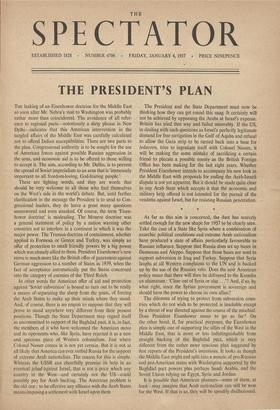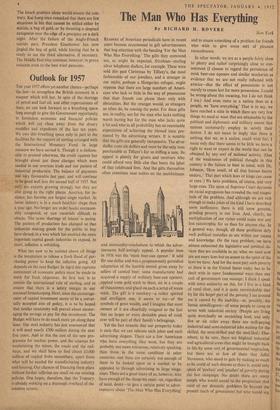THE PRESIDENT'S PLAN
.THE leaking of an Eisenhower-doctrine for the Middle East so soon after Mr. Nehru's visit to Washington was probably rather more than coincidental. The avoidance of all refer- ence to regional pacts—notoriously a dirty phrase in New Delhi—indicates that this American intervention in the tangled affairs of the Middle East was carefully calculated not to offend Indian susceptibilities. There are two parts to the plan. Congressional authority is to be sought-for the use of American forces against possible Russian aggression in the area, and economic aid is to be offered to those willing to accept it. The aim, according to Mr. Dulles, is to prevent the spread of Soviet imperialism to an area that is 'immensely important to all freedom-loving, God-fearing people.'
These are fighting words, and they are words that should be very welcome to all those who find themselves on the West's side in the world's debate. But, until further clarification in the message the President is to send to Con- gressional leaders, they do leave a great many questions unanswered and even unasked. Of course, the term 'Eisen- hower doctrine' is misleading. The Monroe doctrine was a general statement of policy by a nation warning other countries not to interfere in a continent in which it was the • major power. The Truman doctrine of containment, whether applied to Formosa or Greece and Turkey, was simply an offer of protection to small friendly powers by a big power which was already allied to them. President Eisenhower's new move is much more like the British offer of guarantees against German aggression to a number of States in 1939, when the fact of acceptance automatically put the States concerned into the category of enemies of the Third Reich.
In other words the American offer of aid and protection , against 'Soviet subversion' is bound to turn out to be really a means of separating the sheep froth the goats, of forcing the. Arab States to make up their minds where they stand. And, of course, there is no reason to suppose that they will prove to stand anywhere very different from their present positions. Though the State Department may regard itself as uncommitted to support of the Baghdad pact, it is, in fact, the members of it who have welcomed the American move and its opponents who, like Syria, have rejected it as a new and specious piece of Western colonialism. Just where Colonel Nasser comes in is not yet certain. But it is not at all likely that America can ever outbid Russia for the support of extreme Arab nationalists. The reason for this is simple. Whereas the USSR can cheerfully promise its help in an eventual jehad against Israel, that is not a price which any country in the West—and certainly not the US—could possibly pay for Arab backing. The American problem is the old one : to be effective any alliance with the Arab States means imposing a settlement with Israel upon them. The President and the State Department must now be thinking how they can get round this snag. It certainly will not be achieved by appeasing the Arabs at Israel's expense. Britain has tried, that way and failed miserably. If the US, in dealing with such questions as Israel's perfectly legitimate demand for free navigation in the Gulf of Aqaba and refusal to allow the Gaza strip to be turned back into a base for fedayeen, tries to ingratiate itself with Colonel Nasser, it will be making the same mistake of sacrificing a certain friend to placate a possible enemy as the British Foreign Office has been making for the last eight years. Whether President Eisenhower intends to accompany his new look in the Middle East with proposals for ending the Arab-Israeli dispute is not yet apparent. But it should be made quite clear to any Arab State which accepts it that the economic and military help offered is not intended for the pursuit of the vendetta against Israel, but for resisting Russian penetration.
As far as this aim is concerned, the dust has scarcely settled enough for the new shape for 1957 to be clearly seen. Take the case of a State like Syria. where a combination of anarchic political conditions and extreme Arab nationalism have produced a state of affairs particularly favourable to Russian, influence. Suppose that Russia does set up bases in Damascus and Aleppo. Suppose that those bases are used to support subversion in Iraq and Turkey. Suppose that Syria laughs at all Western complaints to the UN and is backed up by the use of the Russian veto. Does the new American policy mean that there will then be delivered to the Kremlin an ultimatum : 'Clear out of Syria or else . .'? And, if so, by what right, since the Syrian government is sovereign and should have the power to choose its own allies?
The dilemma of trying to protect from subversion coun- tries which do not wish to be protected is insoluble except by a threat of war directed against the source of the mischief. Does President Eisenhower mean to go so far? On the other hand, if, for practical purposes, the Eisenhower plan is simply one of supporting the allies of the West in the Middle East, that is more or less indistinguishable from straight backing of the Baghdad pact, which is very different from the rather more spacious plan suggested by first reports of the President's intentions. It looks as though the,Middle East might end split into a mosaic of pro-Russian and pro-American states with Washington supported by the Baghdad pact powers plus perhaps Saudi Arabia, and the Soviet Union relying on Egypt, Syria and Jordan.
It is possible that American planners—some of them, at least—may imagine that Arab nationalism can still be won for the West. If that is so, they will be speedily disillusioned. The Israeli problem alone would ensure the con- trary. Kai hung once remarked that there are few situations in life that cannot be settled either by suicide, a bag of gold, or by thrusting a despised antagonist over the edge of a precipice on a dark night. After the failure of the Anglo-French suicide pact, President Eisenhower has now jingled the bag of gold, while hinting that he is ready to use the third alternative, if necessary. The Middle East may continue, however, to prove resistant even to the best tried panaceas.















































 Previous page
Previous page